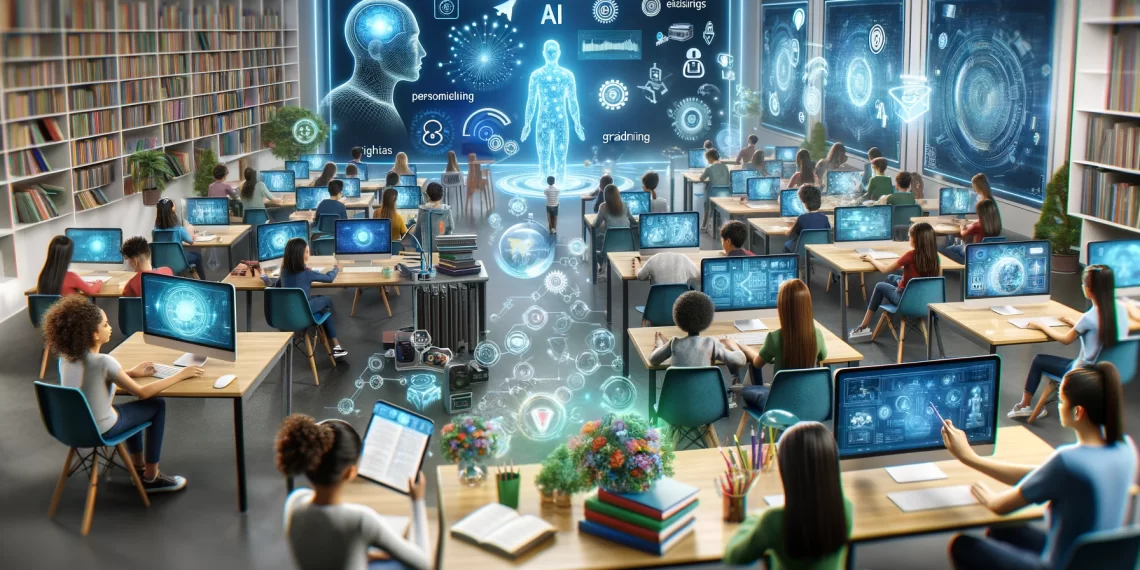Views: 0
Introduction:
Discover how AI is reshaping education with 25 innovative roles, from personalized learning and intelligent tutoring to automated grading and virtual labs, enhancing the educational experience for all students.
- Personalized Learning:
- AI customizes educational content to fit each student’s learning style, pace, and preferences, enhancing individual learning experiences.
- Adaptive Learning Systems:
- AI adjusts the difficulty level of tasks in real-time based on student performance, ensuring optimal learning conditions.
- Intelligent Tutoring:
- AI-powered tutors provide personalized instruction and feedback, helping students understand complex concepts.
- Automated Grading:
- AI systems can grade assignments and exams quickly and accurately, saving teachers time and providing instant feedback to students.
- Predictive Analytics:
- AI analyzes student data to predict academic performance and identify those at risk of falling behind, enabling early intervention.
- Smart Content:
- AI can generate interactive and engaging content, such as digital textbooks, simulations, and educational games.
- Virtual Classrooms:
- AI facilitates online learning environments, providing tools for interactive and collaborative virtual classrooms.
- Language Translation:
- AI-powered translation tools help students from diverse linguistic backgrounds access educational materials in their native languages.
- Speech Recognition:
- AI can transcribe spoken language into text, aiding students with disabilities or those learning new languages.
- Administrative Automation:
- AI automates administrative tasks like scheduling, attendance tracking, and report generation, allowing educators to focus more on teaching.
- Learning Analytics:
- AI analyzes data from learning management systems to provide insights into student engagement and learning outcomes.
- Career Counseling:
- AI-based career counseling tools help students identify suitable career paths based on their interests and strengths.
- Behavioral Analysis:
- AI can monitor student behavior to identify patterns that may indicate social or emotional issues, allowing for timely support.
- Content Curation:
- AI curates and recommends relevant educational resources, ensuring students have access to high-quality learning materials.
- Exam Proctoring:
- AI-powered systems can monitor online exams to ensure academic integrity and prevent cheating.
- Virtual Labs:
- AI creates simulated lab environments where students can conduct experiments and practice skills safely.
- Learning Pathways:
- AI designs customized learning pathways for students, guiding them through courses and resources that match their learning needs.
- Student Support:
- AI chatbots provide 24/7 support to answer student queries and offer guidance on academic and administrative matters.
- Real-Time Feedback:
- AI provides immediate feedback on student work, helping them learn and improve continuously.
- Special Education:
- AI tools support students with special needs by providing tailored learning experiences and assistive technologies.
- Collaboration Tools:
- AI facilitates collaboration among students and teachers through intelligent communication platforms and tools.
- Resource Optimization:
- AI helps educational institutions optimize resource allocation, such as classroom space and teacher assignments.
- Professional Development:
- AI provides personalized professional development resources and training for educators to improve their teaching practices.
- Emotional AI:
- AI can gauge student emotions and engagement levels, helping teachers adapt their instruction to maintain interest and motivation.
- Continuous Improvement:
- AI systems continuously learn from data, improving their effectiveness in enhancing educational experiences over time.
Research and References:
- Chen, L., Chen, P., & Lin, Z. (2020). Artificial intelligence in education: A review. IEEE Access, 8, 75264-75278.
- Holmes, W., Bialik, M., & Fadel, C. (2019). Artificial Intelligence in Education: Promises and Implications for Teaching and Learning. Center for Curriculum Redesign.
- Luckin, R., Holmes, W., Griffiths, M., & Forcier, L. B. (2016). Intelligence Unleashed: An Argument for AI in Education. Pearson.
- Brynjolfsson, E., & McAfee, A. (2017). The Business of Artificial Intelligence. Harvard Business Review.
- Chui, M., Manyika, J., & Miremadi, M. (2016). Where machines could replace humans—and where they can’t (yet). McKinsey Quarterly.
AI’s integration into education is enhancing the learning experience by providing personalized, efficient, and engaging educational opportunities for all students.











